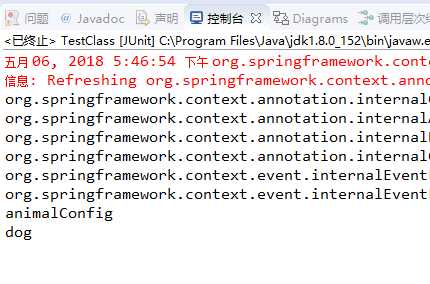标签:pac tor style 自己 xtend print string 根据 lob
就是当满足特定的条件时Spring容器才创建Bean,Spring中通过@Conditional注解来实现条件化配置bean
package com.sl.ioc; import org.springframework.context.annotation.Bean; import org.springframework.context.annotation.Conditional; import org.springframework.context.annotation.Configuration; @Configuration public class AnimalConfig { @Bean("dog") @Conditional(DogCondition.class) public Dog DogInstance() { return new Dog(); } @Bean("cat") @Conditional(CatCondition.class) public Cat CatInstance() { return new Cat(); } }
@Conditional和 :Condition接口的实现
public @interface Conditional { /** * All {@link Condition}s that must {@linkplain Condition#matches match} * in order for the component to be registered. */ Class<? extends Condition>[] value(); } public interface Condition { /** * Determine if the condition matches. * @param context the condition context * @param metadata metadata of the {@link org.springframework.core.type.AnnotationMetadata class} * or {@link org.springframework.core.type.MethodMetadata method} being checked * @return {@code true} if the condition matches and the component can be registered, * or {@code false} to veto the annotated component‘s registration */ boolean matches(ConditionContext context, AnnotatedTypeMetadata metadata); }
Conditional注解通过value传入一个类,实现Condition接口,通过实现Condition接口中matches方法决定是否需要装配Bean,如果满足条件需要创建bean则返回true,否则返回false
自己定义两个继承Condition接口的类:通过ConditionContext查找当前环境中是否存在dog或者cat属性,如果存在,则创建对应的bean对象,具体实现如下:
package com.sl.ioc; import org.springframework.context.annotation.Condition; import org.springframework.context.annotation.ConditionContext; import org.springframework.core.env.Environment; import org.springframework.core.type.AnnotatedTypeMetadata; public class DogCondition implements Condition { @Override public boolean matches(ConditionContext context, AnnotatedTypeMetadata metadata) { Environment environment = context.getEnvironment(); boolean flag= environment.containsProperty("dog"); return flag; } }
package com.sl.ioc; import org.springframework.context.annotation.Condition; import org.springframework.context.annotation.ConditionContext; import org.springframework.core.env.Environment; import org.springframework.core.type.AnnotatedTypeMetadata; public class CatCondition implements Condition { @Override public boolean matches(ConditionContext context, AnnotatedTypeMetadata metadata) { Environment environment = context.getEnvironment(); boolean flag= environment.containsProperty("cat"); return flag; } }
package com.sl.ioc; import org.springframework.stereotype.Component; @Component public interface Animal { void Say(); } package com.sl.ioc;import org.springframework.stereotype.Component; @Component public class Cat implements Animal { @Override public void Say() { System.out.println("I am a cat"); } } package com.sl.ioc; import org.springframework.stereotype.Component; @Component public class Dat implements Animal { @Override public void Say() { System.out.println("I am a dog"); } }
测试代码:
public class TestClass { @Test public void TestGetDoInstance() { System.setProperty("dog",""); ApplicationContext context = new AnnotationConfigApplicationContext(AnimalConfig.class); String[] beanNames = context.getBeanDefinitionNames(); for(String bean : beanNames) { System.out.println(bean); } } }
运行测试可以看到输出的beanname中会包含dog的bean:

Spring自动装配时如果存在多个bean能够匹配的话,那么这种情况会阻碍Spring通过属性、构造函数或方法进行装配。针对这种情况,Spring提供了多种 可选方案来解决这个问题,可以选择一个bean作为首选的bean,或者使用限定符来确定唯一bean
Spring提供@Primary注解来设置首选Bean,当初选自动装配歧义时,会选择装配带有@Primary的bean
沿用上面的示例代码,尝试装载animal
@Component public class AnimalInstance { @Autowired public Animal animal; }
当Spring尝试注入animal实例时,由于Dog和Cat都继承自Animal,所以此处产生了歧义,下面通过使用@Primary指定首选bean
@Component @Primary //指定首选bean public class Cat implements Animal { @Override public void Say() { System.out.println("I am a cat"); } }
同样也可以使用XML配置来实现:<bean>元素提供了primary属性来设置首选bean
<bean id="cat" class="com.sl.ioc.Cat" primary ="true" >
测试代码:
public class TestClass { @Test public void TestGetDoInstance() { //应用上下文 ApplicationContext context = new AnnotationConfigApplicationContext(AnimalConfig.class); AnimalInstance animalInstance = context.getBean(AnimalInstance.class); animalInstance.animal.Say(); } }
运行结果:

首选项只是标识一个优先选择装载的bean,如果配置了多个@Primary,那么将带来新的歧义,Spring依然无法完成自动装配,可以通过下面限定符来解决这个问题
Spring提供@Qualifier注解来指定想要注入的具体bean。例如上面的示例,如果指定注入dog:
package com.sl.ioc; import org.springframework.beans.factory.annotation.Autowired; import org.springframework.beans.factory.annotation.Qualifier; import org.springframework.stereotype.Component; @Component public class AnimalInstance { @Autowired @Qualifier("dog") public Animal animal; }
解释一下:@Qualifier("dog")表示指定的bean具有”dog”限定符,spring中bean如果没有指定限定符,会使用默认限定符,即使用beanID作为限定符。所以上面是恰好使用了dog bean的ID作为了限定符。也可以写成如下方式:
@Component @Qualifier("specialdog") //为bean指定限定符 public class Dog implements Animal { @Override public void Say() { System.out.println("I am a dog"); } }
@Component public class AnimalInstance { @Autowired @Qualifier("specialdog") //使用上面定义的限定符 public Animal animal; }
Spring容器在创建bean实例的同时,还允许指定bean实例的作用域,常见作用域有一下几种:
1:单例作用域(Singleton)
2:原型作用域(Prototype)
3:会话作用域(Session)
4:请求作用域(Request)
5:全局会话作用域(globalSession)
在整个应用中,Spring IOC容器为使用singleton模式的bean只创建一个实例,Spring将会缓存Bean实例,任何对该类型beand请求都会返回该实例。单例也是Spring默认的作用域。具体使用如下,通过XML配置
<bean id="beanid" class="com.sl.ioc.xxx" scope="singleton" ></bean>
<bean>元素提供了scope属性来设置singleton作用域
对应的注解:
@Scope(ConfigurableBeanFactory.SCOPE_SINGLETON)
每次注入或者从Spring容器中获取时都创建一个新的bean实例:
<bean id="beanid" class="com.sl.ioc.xxx" scope="prototype" ></bean>
<bean>元素提供了scope属性来设置singleton作用域
对应的注解:
@Scope(ConfigurableBeanFactory.SCOPE_PROTOTYPE)
在web应用中,针对每个会话,Spring容器根据bean定义创建的bean实例,只在当前会话Session中有效,XML配置如下:
<bean id="beanid" class="com.sl.ioc.xxx" scope="session" ></bean>
针对某个HTTP Session,Spring容器会根据bean定义创建一个新的bean实例,该bean仅在当前HTTP Session内有效。所以可以根据需要放心的更改bean实例的内部状态,而不影响其他Http Session中bean实例。当HTTP Session最终被废弃的时候,在该HTTP Session作用域内的bean也会被销毁掉。
<bean id="beanid" class="com.sl.ioc.xxx" scope="globalSession" ></bean>
在web应用中,针对每次请求,Spring容器根据bean定义创建新的bean实例,只在当前请求内有效
<bean id="beanid" class="com.sl.ioc.xxx" scope="request" ></bean>
该bean实例只在当前请求内有效,在请求处理完成之后bean也会被销毁掉
类似于session作用域,只是其用于portlet环境的web应用。如果在非portlet环境将视为session作用域。
标签:pac tor style 自己 xtend print string 根据 lob
原文地址:https://www.cnblogs.com/ashleyboy/p/9000436.html